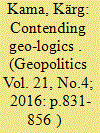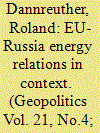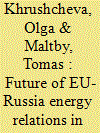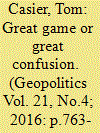|
|
|
Sort Order |
|
|
|
Items / Page
|
|
|
|
|
|
|
| Srl | Item |
| 1 |
ID:
150529


|
|
|
|
|
| Summary/Abstract |
The EU and Russia exist in a complex and, at times, seemingly paradoxical and contradictory relationship. On the one hand, the two sides remain rhetorically committed towards a close and developing strategic partnership. On the other, the EU-Russia political relationship is currently at its lowest ebb since the end of the Cold War due to the crisis in Ukraine. A mixture of politics, economics and geography provide an impetus for the development of mutually beneficial relations and, at the same time, obstacles to the achievement of such a positive partnership.
|
|
|
|
|
|
|
|
|
|
|
|
|
|
|
|
| 2 |
ID:
150539


|
|
|
|
|
| Summary/Abstract |
The US rebalance to the Asia Pacific is consistently interpreted as a response to China’s material rise. While not entirely incorrect, this assumption – derived from an overriding faith in the explanatory significance of relative state capabilities – fails to explain why rapidly rising others, most notably India, remain absent from regional US security discourse, and why a heavy US presence in Asia predates China’s ascent of the 1970s onwards. To address these problems and offer an improved explanation of what the rebalance is, how and why it has come about, and what it is designed to achieve within the context of China’s rise, this analysis draws from critical geopolitics and postcolonial theory. It argues that the rebalance is best conceived as the (re)articulation of historical discourses which construct certain foreign Others like China as challenges to the ontological American self, making the rebalance an attempt to pacify a particular rising identity as much as a rising state actor. The analysis is motivated in part by the question of how the rebalance is enabled in its current form. From here, the article addresses an increasing yet regressive tendency of International Relations theory to deny studies of the ‘how possible’ explanatory value, encouraging their marginalisation in favour of examinations into ‘why’ political decisions are made.
|
|
|
|
|
|
|
|
|
|
|
|
|
|
|
|
| 3 |
ID:
150534


|
|
|
|
|
| Summary/Abstract |
Engaging with nascent scholarly efforts to foreground the ‘geo’ of geopolitics, this article examines how certain low-quality geological substances are constituted as strategic, ‘unconventional’ fossil fuel resources, the exploitation of which is deemed indispensable for energy security reasons. Based on a detailed study of oil shale exploitation in Estonia, the paper specifically analyses the politics of knowledge that enable such carbon-intensive and energy-inefficient industries to perpetuate at the national level and, moreover, subvert the neoliberal imperatives of energy sector deregulation and decarbonisation arising from EU policies. This analysis leads to two key arguments. At one level, the Estonian case evidences and contextualises the growing recognition that ‘energy security’ represents a multifaceted and dynamic construct as it highlights, in particular, the contingency of expert knowledge in its conceptualisation and performance. What counts as energy security is in this case articulated via shifting and contested modes of knowledge-making, whereby state- and market-led modes of energy governance are continuously renegotiated. At another level, however, the politics of knowledge is explained here as exercised through contending ontologies of the fossil fuel resource that pivots security claims, or ‘geo-logics’, which has multiplying effects on resource materiality.
|
|
|
|
|
|
|
|
|
|
|
|
|
|
|
|
| 4 |
ID:
150542


|
|
|
|
|
| Summary/Abstract |
Home to more than 160 million people, the Nile River Basin has become one of the hotspots of the global quest for food, water and energy security. Moving closer to its completion, the Grand Ethiopian Renaissance Dam (GERD) highlights the interplay between the food, water, and energy sectors and their implications on geopolitical power relations in the region. Despite Ethiopia having the highest volumetric contribution to the Nile river flow, Egypt has maintained hydro-hegemony over the basin for several decades on the basis of historical claims and colonial agreements. Egypt has stated that its volumetric share of the Nile’s water is not sufficient to sustain its growing population, declaring water availability a matter of national security. However, for Ethiopia, the GERD represents a crucial moment in its development agenda, acting as both a counterhegemonic power play, as well as a means to improving the hydropower capacity of the country, and ensuring future food security. This paper explores the various hegemonic and counter-hegemonic strategies employed by Egypt and Ethiopia respectively, highlighting the various ways in which food, water, and energy concerns are intrinsic components of the asymmetric power configurations of the Nile River Basin. By navigating the debate surrounding the GERD, this paper highlights the necessity of incorporating the food, water, and energy nexus into studies of hydro-hegemony and counter-hegemony. This allows the future policy direction for nexus management and governance in the Nile River Basin to move beyond benefit sharing, instead steering towards power sharing.
|
|
|
|
|
|
|
|
|
|
|
|
|
|
|
|
| 5 |
ID:
150538


|
|
|
| 6 |
ID:
150532


|
|
|
|
|
| Summary/Abstract |
This article argues that strategic culture, long consigned to the margins of broader, more substantial IR theories, offers a novel mode by which to explore recent developments in EU-Russia energy relations. Approaching seminal strategic policies from the perspective of institutionalised norms and cultural value-sets, strategic culture explores the power of the past and its ability to produce and influence national attitudes in governments and societies. This enables analyses of strategic energy relations between actors like the EU and Russia to move beyond obvious polarities to nuanced insights about the national value sets by which energy security is itself rendered strategic. Beginning with the individual strategic cultures of both the EU and Russia within the area of contemporary energy security policies, the article then appraises the range of bilateral EU-Russia energy security policies, suggesting that in many ways, these shared policies constitute a sector-specific strategic energy culture that includes both the EU and Russia. Areas of ongoing intransigence and policy convergence in EU-Russia energy security approaches constitute the case studies, illustrating that both sides are essentially motivated toward the same goals of energy security, market prosperity and actor-based prestige, but on the basis of vastly different visions, using widely diverse modes of implementation, and with dissimilar standards of evaluation. The analysis then appraises whether this co-constituted area is progressive or regressive in terms of the cooperation or conflict generated between the two sides, concluding that a basis of acknowleged commonalities – made available through strategic culture perspectives – both sides retain the impetus to cooperate to the point of complete agreement on some areas, whilst simultaneously remaining in conflict to the point of aggression in others.
|
|
|
|
|
|
|
|
|
|
|
|
|
|
|
|
| 7 |
ID:
150533


|
|
|
|
|
| Summary/Abstract |
In 2013, there was a joint commitment to “long term strategic EU-Russia energy cooperation”.11. EU/RF Roadmap, ‘Roadmap EU-Russia Energy Cooperation until 2050‘, European Commission and Russian Government, March 2013, p. 4, available at .
View all notes
Whilst centred on oil and gas, it is noted that “the importance of renewables for EU-Russia energy relations should grow too”,22. Ibid., p. 21.
View all notes
and that for energy efficiency, “cooperation potential is immense and could… contribute to the objective of a Pan-European energy area”.33. Ibid., p. 26.
View all notes
Given this shared objective, this article analyses EU and Russian energy decarbonisation policy objectives and considers the potential for a supplementary trade relationship based on renewable energy flows and decarbonisation-related technology, as well as the implications for existing energy trade. Despite declarative statements of mutual interest, shared objectives and cooperation in decarbonisation policy, there has been very limited cooperation by early 2016. The EU has set ambitious plans to decarbonise its economy and energy sector by 2050. However, in Russia energy policy is dominated by hydrocarbon exports, decarbonisation targets are modest, and there are major problems with their implementation. The drivers of EU and Russian energy policies are evaluated, and the argument advanced is that different understandings of energy security and types of energy governance provide major obstacles to decarbonisation cooperation and trade. However, it is argued that ideas about energy policy and security are contested and subject to change and there exists significant potential for mutual gain and cooperation in the longer term.
|
|
|
|
|
|
|
|
|
|
|
|
|
|
|
|
| 8 |
ID:
150541


|
|
|
|
|
| Summary/Abstract |
The disregard of animal subjectivity in geopolitics is challenged as outdated and arrogant in light of the growing interdisciplinary understanding of the relational, dispersed, and co-evolving nature of agency. First, the war horse is examined by joining the instrumental approach of military history with the emphasis on emotion in animal studies. Knowledge about animal subjectivity is expanded by demonstrating how the horse itself has co-produced the Finnish experience in World War II and the national narrative about this conflict. Calculable territory, biopolitical state intervention, the political ecology of war, affect, and the body build connections between the horse’s war and theory, methodology, and concepts in political geography and geopolitics. Equine labour and response to the state’s geopolitically motivated breeding exercises during peace then bridge animal studies and critical geopolitics, showing how the horse has supported the formation of Finnishness. Finally, a look at contemporary mobility, geopolitics of disease, and biometric bordering exemplifies how the horse continues to adapt to new roles in Finnish society and contribute to human institutions and governance. The examination demonstrates the importance of other-than-human beings in the making of Finland as a political space and place. Suggestions for further studies and data point to opportunity. The article serves those who question rigid categorisations and segmentation of research and pedagogy into intellectually self-contained islands.
|
|
|
|
|
|
|
|
|
|
|
|
|
|
|
|
| 9 |
ID:
150530


|
|
|
|
|
| Summary/Abstract |
This article explains why a considerable part of the International Relations literature frames highly complex energy relations between the EU and Russia in terms of simple, exclusive geopolitical intentions. Drawing on Construal Level Theory, it addresses the gap between immediate interaction between various private and public actors with their own agendas and individual intentionalities and assumed collective geopolitical intentionalities. Because of the degree of abstraction, collective motivations are attributed to actors like Russia and the EU. This attribution risks to be subject to bias. It is argued that higher psychological distance increases the likelihood of more radical and ideologised framing. These abstract schemes do not follow from the endogenous energy dynamics but are function of a broader logic of competition which has characterised EU-Russia relations.
|
|
|
|
|
|
|
|
|
|
|
|
|
|
|
|
| 10 |
ID:
150536


|
|
|
|
|
| Summary/Abstract |
Russian external energy policy is frequently described as geopolitical (as opposed to EU energy policy, which is often characterised as market-based). This article reviews geopolitical and market approaches in existing studies and identifies paradigmatic and instrumental levels in each of them. It then proceeds to demonstrate that although the geopolitical paradigm dominates in Russia, Russia has also reacted to the EU’s third liberalisation package, using legal and technocratic instruments, which are parts of the market approach. Each set of instruments has its institutional basis in Russia: the President, the Ministry of Foreign Affairs (MFA) and Gazprom work in geopolitical ways but with frequent recourse to legal instruments, the Ministry of Economic Development (MED) promotes legal instruments and the Ministry of Energy (ME) is the centre of the technocratic activities, which Gazprom also frequently applies at present. This study therefore provides a more complex picture of Russian external energy policy. Moreover, it reveals a potential opening for a degree of policy convergence between the EU and Russia. In this context it is regrettable that legal and technocratic instruments were compromised as a result of the 2014 worsening in EU-Russian relations.
|
|
|
|
|
|
|
|
|
|
|
|
|
|
|
|
| 11 |
ID:
150537


|
|
|
|
|
| Summary/Abstract |
In the sphere of natural gas, Russia and the EU share an interdependent relationship: Russia is the single largest supplier of natural gas to the EU, while the EU is Russia’s largest gas export market. In May 2014, a deal was struck between Gazprom and the China National Petroleum Corporation to enable large-scale Russian gas exports to China. What impact could this deal have on the EU-Russia gas relationship? This article analyses Russia’s existing and proposed gas production and export infrastructure for the delivery of natural gas to Europe and to China, and the extent to which increased gas exports to the East could result in the limitation of Russian gas exports to Europe. It is concluded that, due to its dependence on new gas production in eastern Siberia and the construction of new, purpose-built pipeline infrastructure, the Gazprom-CNPC deal of May 2014 will not have a significant impact on Russia’s gas exports from north-western Siberia to the EU. The launch of talks aimed at delivering Russian gas from the Yamal Peninsula to China via the ‘western route’ opened the first possibility for Russia to balance its gas exports between East and West. However, this is unlikely to generate price competition between Europe and China, due to Gazprom’s inability to extract a ‘European’ price for its gas exports to China. This suggests that Gazprom will not re-direct significant volumes away from Europe towards China, but rather will seek additional export volumes.
|
|
|
|
|
|
|
|
|
|
|
|
|
|
|
|
|
|
|
|
|